How to choose the best gas boiler: review of criteria for choosing the best unit
Are you going to buy an efficient gas boiler that can provide heat in the most severe frosts? When choosing equipment for your home, there are many factors to consider. Which option is the best? What criteria are the most important? Owners of both private houses and apartments have to think about solving this problem.
Agree, it’s a shame to pay twice and end up with an insufficiently functional boiler that is unable to heat a country house when cold weather sets in. Therefore, before choosing a gas boiler in a store, you will have to weigh the pros and cons. Otherwise, you may end up with a model that is far from suitable.
We will help you decide on the main criteria that radically influence your choice. Useful recommendations and important nuances are outlined in our article. To help the homeowner, photographs and a selection of videos with advice from experienced experts in the field of heat supply are provided.
The content of the article:
The main nuances of choosing a gas boiler
The absence or constant interruptions of centralized heating and hot water supply force owners of cottages and city apartments to create own autonomous systems.
Their main element is a boiler, which, by burning fuel, heats the coolant for the heating system and water for domestic needs.
The choice in favor of gas equipment is due to the cost-effectiveness of using gas as a fuel. All other options for burning fuel are more expensive or produce significantly less heat.
Plus, modern heaters of this type do not require constant supervision. I connected the unit to the main pipe or cylinder, and it works uninterruptedly as long as there is something to burn.
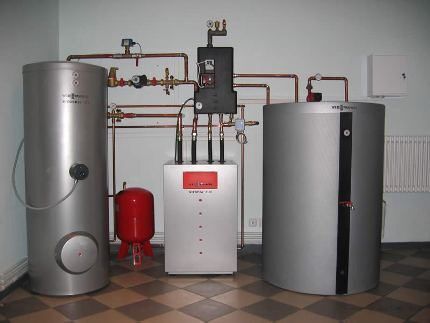
However, in order for a gas boiler to function properly and in optimal mode, it is necessary to choose it wisely when purchasing and regularly maintain it after connection.
There are a lot of different functionality and special modules within the models of this equipment. The purchase of a gas heating unit should be approached thoughtfully.
There are many criteria for choosing a gas boiler, but the main ones are:
- Power output by the device.
- Layout solution (number of circuits, type of housing and heat exchanger material).
- Place for installation.
- Availability of automation for safe operation.
All these issues are closely interconnected. Lack of space for a large unit or the desire to install a device with an aesthetic appearance in the kitchen forces you to choose a wall-mounted model with less power than a floor-standing option. And the need to heat hot water for a washbasin and shower forces you to look for a boiler with two circuits.
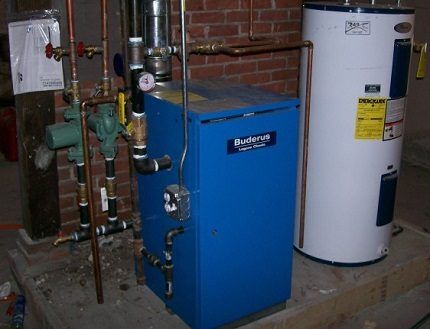
Subtleties of choosing a boiler for heating and hot water supply
Modern thermal equipment has a stylish appearance, is filled with all kinds of sensors and can operate in several modes.
However, a promoted or widely advertised gas boiler does not mean it is the best and the best. When choosing, you should focus not so much on its design as on its functionality.
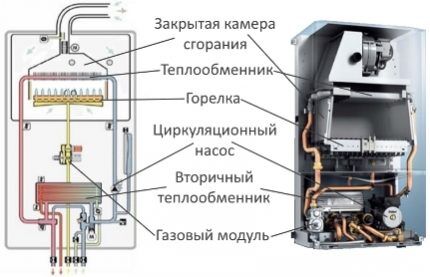
First, the gas in the burner is ignited using an electronic system or a piezoelectric element. Then, as a result of its combustion in the firebox, water is heated through a heat exchanger, which is sent to the circuit of the heating system.
This is how classic single-circuit models work. To prepare hot sanitary water, you need to choose dual-circuit installation or connect the boiler.
Criterion #1 - material and design of the heat exchanger
The choice of internal heat exchanger must be approached with special attention. Water moves inside it, and a fairly powerful and high-temperature flow of thermal energy acts on the outside.
On the one hand, the material used to make it must be very durable, and on the other, thermally conductive. The more heat it transfers from the combustion of gas coolant, the higher the efficiency of the installation.
Manufacturers equip gas boilers with heat exchangers from:
- cast iron;
- of stainless steel;
- copper
Due to the lack of predisposition to corrosion from contact with water, the cast iron option is the most durable. But he has quite a lot of weight.And if used incorrectly, it can burst at the border between areas with greatly different temperatures. To prevent this, you will have to wash it more often.
The steel heat exchanger is the most common. It is cheaper than cast iron and copper analogues. Plus, this metal has good ductility, which reduces the likelihood of cracks. However, steel in the heating circuit quickly corrodes.
Copper is more resistant to corrosion processes and has better heat transfer characteristics. The heat exchanger made from it is lightweight and compact in size. But this option costs a lot of money.
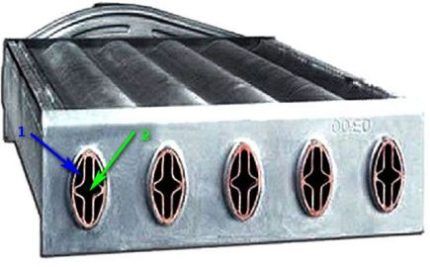
According to the internal design, the heat exchange coil can be conventional or bithermal. The first involves connecting exclusively one water circulation circuit, and the second at the same time two. Double-circuit boilers are equipped with a pair of conventional heat exchangers or one bithermal one. The second option is cheaper.
Criterion #2 - type of unit location
Gas boilers are installed on the floor or hung on the wall. Models of the first type are called floor-standing and are characterized by large dimensions. Most often they have cast iron or steel heat exchangers. These options have better equipment price/power ratios than their wall-mounted counterparts.
Main disadvantage floor-standing boilers – heavy weight. But if you need a powerful unit, then you cannot do without floor-mounted equipment. Mounted modifications are much inferior in power to floor-mounted ones.
The choice here depends on your needs.A large private house requires a powerful model, but for a city apartment a more compact and less efficient device will be sufficient.
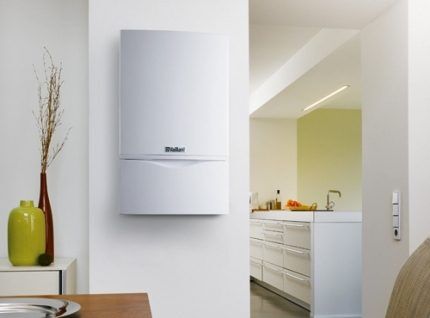
Unlike floor-standing models, many of which can operate without an electrical connection, almost all mounted boilers are energy dependent.
The latter are effective, easy to use and offer advanced customization options. But in the event of a power outage, they are of no use; in the event of a power failure, the heat will disappear along with the light.
For a country house, it is best to take a non-volatile floor-standing boiler with mechanical control. It's easy to installation and connection, it does not have programmable thermostats and displays, but it will generate heat even if the cottage is completely disconnected from the power supply. And the service life of floor-mounted equipment is longer than that of a wall-mounted competitor.
Criterion #3 - number of circuits
For organizing purely heating in a home, the best option for a gas boiler is a single-circuit model. The same applies to the situation when only a heater is needed to supply hot water to the faucet above the sink.
If it is planned to simultaneously connect heating and/or underfloor heating system pipes, as well as hot water supply, to a gas heating unit, then it must have two or more circuits.
It is also possible to connect indirect heating boiler. In this case, a pipe is drained from a single-circuit boiler into a container with heated water.Technically, such schemes are allowed, but the only heat exchanger will work under increased load.
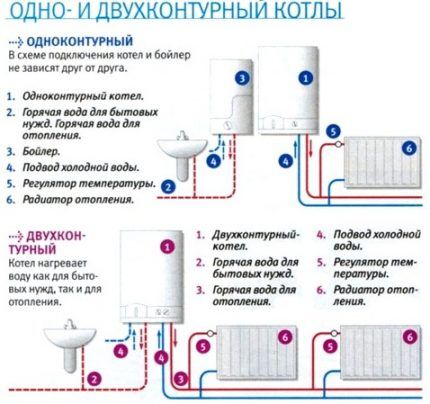
Most double-circuit units heat hot water for domestic use using a flow method, and this is not very economical. It is better to install a remote boiler tank or choose a gas boiler with a built-in large-volume water heater.
Both options will allow you to heat up to one cubic meter of water and maintain its high temperature for a long time. Heaters with one circuit are ideal for apartments, dachas with temporary residence and cottages where a family of two or three people lives.
For a private house on several floors, with a heated swimming pool or underfloor heating system It is best to choose a double-circuit gas boiler.
Criterion #4 - combustion chamber, type of ignition and burner
Oxygen is required to maintain the gas combustion process in the boiler. It can enter the firebox from the room or from the street. In the first case, the heater is equipped with an atmospheric burner with natural air flow, and in the second - a closed burner with forced air injection.
Accordingly, there are two types of combustion chambers:
- Open – oxygen to maintain the flame is taken directly from the room with the heating equipment.
- Closed – air for gas combustion is sucked into the firebox from the street through a coaxial chimney or an additional ventilation pipe.
In order to correctly determine which gas boiler is better - with a closed chamber and a turbo burner or with an open firebox and an atmospheric burner, you need to clearly understand that the second option will require the installation of a chimney five to six meters high to ensure natural draft.
However, it is not possible to bring such a high pipe onto the roof everywhere.
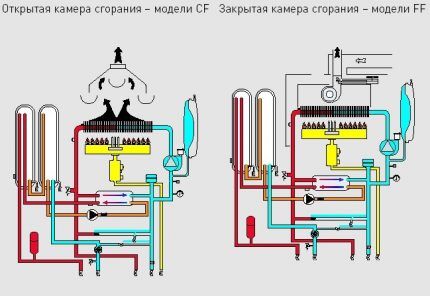
To heat an apartment in a city high-rise building, it is better to buy a gas boiler with an air blower and coaxial chimney. It has higher efficiency and is easier to install. But it is volatile, the fan will not work without voltage in the mains.
Therefore, in order not to be left without heat at some point, you should take care of an uninterruptible power supply or a backup power generator.
It is recommended to install a heater with an open chamber outside residential premises. An extension or boiler room in the basement is best suited for this purpose. In this case, it is necessary to pay additional attention to the quality of ventilation in this room.
In some cases, you will even have to do forced ventilation, otherwise there may not be enough oxygen for efficient combustion of natural gas.
On the one hand, the closed version has a higher efficiency and does not burn oxygen in the room, but on the other hand, such boilers are more expensive and depend on electricity. Without the latter, a gas heater with electric ignition will also stop working.
If there are problems with uninterrupted power supply, then it is better to prefer equipment with piezo ignition, which by definition does not require electricity to operate.
Criterion #5 - automation, adjustment and diagnostics
To make your life easier, when choosing a gas boiler you should pay special attention to it “electronic stuffing”. Manufacturers offer a lot of additional options that greatly facilitate the operation of gas heating equipment.
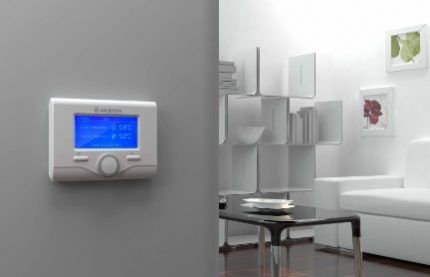
Power adjustment can be:
- single stage;
- two-stage;
- smooth with flame modulation.
The simplest and cheapest option is single-stage with one “ON/OFF” button. The boiler power in this case is actually not regulated in any way. The burner in it is either on or off.
Models with two-stage adjustment assume the presence of a pair of operating modes with different power.
From this point of view, the best gas boilers are those with a modulator, which allows you to smoothly regulate the intensity of fuel combustion. The automation, depending on the water flow and the temperatures set by the owner, independently turns on the required number of burners and adjusts the height of their flame.
To ensure safety, the heaters are equipped with:
- sensors for monitoring pressure in the gas main, expansion tank and pumped water circuits;
- sensors that monitor flame attenuation;
- self-locking system in various emergency situations (fires, smoke, power outages);
- pressure relief valves;
- water purification filters;
- overheating thermostats.
All this automation makes it possible to protect heating equipment from damage in the event of emergency situations, as well as to maximize the efficiency of its operation.
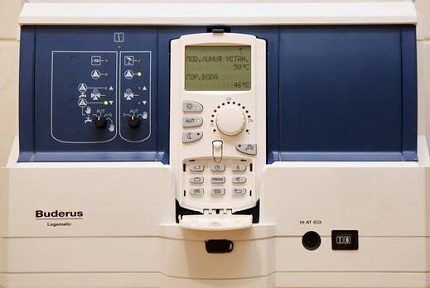
You can configure the boiler so that, when there are no people in the house, it operates in the lowest cost mode, and half an hour before the owners arrive, it raises the room air temperature to more comfortable levels.
What power should the boiler be?
The technical documentation for a gas heater necessarily contains information about the rated power. Before purchasing equipment, it is advisable calculate the room's heat requirement. Often the manufacturer also indicates the square footage of the room that this equipment will be able to heat.
But all this is quite conditional; without competent thermal engineering calculations for a particular house, you should not choose a gas boiler.
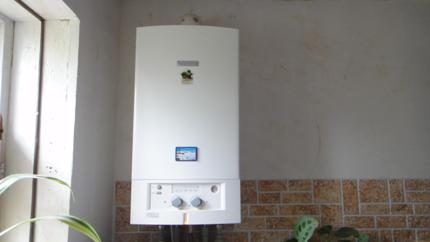
Recommendations of 1 kW for every 10 m2 cottages are very average indicators. They extremely rarely reflect reality.
When making calculations, an experienced heating engineer should take into account:
- area and cubic capacity of each room;
- climatic conditions of the region of residence;
- quality of insulation of external walls;
- sizes and number of windows, as well as the type of double-glazed windows in them;
- the presence of balconies and street doors;
- characteristics of the heating system, etc.
In addition, the quality of the fuel and the gas pressure in the line are taken into account. Separate calculations are made for the DHW system. And only then both figures are summed up and increased by 15–20% in reserve, so that the boiler can cope with both constant and peak loads without problems.
Conclusions and useful video on the topic
Video #1. How to choose a gas boiler correctly:
Video #2. How to select a gas-type heater based on the declared power:
Video #3. Which floor-standing boiler is best for a cottage:
It is essentially impossible to give unambiguous advice on which gas boiler is best to purchase. The heater for hot water supply and heating system for each specific home must be selected individually. And this should be done only on the basis of calculations by a competent heating engineer, taking into account all the nuances.
There are a lot of criteria and subtleties in choosing a boiler. Before going to the store, you should study everything carefully, and it is better to consult with a specialist in this field.
Would you like to share useful tips on selecting and purchasing a gas boiler? Do you have your own thoughts and experience in operating the unit? Did you find any shortcomings in the material presented for review? Please write comments in the block located below the text. Communication will help clarify difficult issues faster.
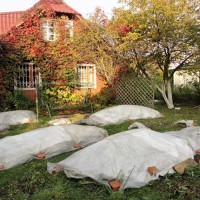

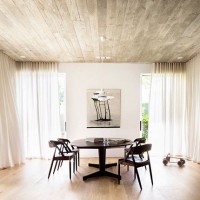
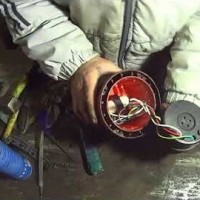
Personal opinion (if you live in a region with a cool climate), take a little more power. Once, for business purposes, I needed to heat a large basement room (practically a hangar). The peculiarity is that the temperature had to be maintained constantly the same. They got greedy, did the math, and in the end almost ran out of money. Therefore, pay special attention to the climate of your region, and to the structural features. It’s better to consult with professionals.
In principle, this is how I chose my boiler. I agree, we need to take power with reserve. I took almost 2 times the reserve, because this is my own house and in the future I will be completing it: either expanding it or adding a second floor. Regarding the contours. I took 2 circuits. This really saves space and money. The circuits are independent and work like a charm. I also recommend that after choosing a boiler, call customer service and find out if there are any problems with this model, or if it works without complaints.
Big problem with connection: wait for gasification for two years or consider alternative heating options: pallets, firewood, electricity?
And this is up to you to decide. Each boiler has its own nuances. Of course, gas is cheaper to operate, but MUCH more expensive to install and connect compared to other options.I already had a site with gas, so, in general, I didn’t think about the choice. But my father was building in a village where he simply doesn’t exist; he has a pellet plant. He is happy and doesn’t think about switching to gas. My advice is to scour the forums, if pellets can be obtained without problems in your region, then this boiler will be the most economical. My father has a Dozatekh boiler (Russian), good, for heating 100 square meters, plus a hot water heating circuit is also connected. If you put it, then it’s probably like this. At least its efficiency is close to the parameters of a gas boiler (of course, if you do the piping correctly). And a heat exchanger for five lines. This is a lot, basically all boilers are three-line, and this is a loss of heat.
In your case, the optimal solution would be to purchase a combination boiler. I think the best option would be an electric/gas combination boiler. This is exactly the option when you can say that you kill two birds with one stone.
You are installing a boiler that will heat your home before connecting gas. All piping, piping, radiators - all this will already be ready for using gas heating. That is, this is a universal solution: after connecting the gas, you do not need to redo anything essentially - that is the beauty of using a combination boiler.
If we consider alternatives, then later we will have to redo the piping, pipes, etc. for gas. The issue price is about $500 for a combination boiler and higher. For example, ATEM Zhitomir 10SNV/KE-4.5, which can simultaneously operate on two types of energy, and also separately, of course.
Once upon a time, we also had this acute issue and our heating system was calculated in such a way that after installing an electric boiler, we could connect a gas boiler at any time and it would also work effectively on the already installed pipe development. But I personally like the option proposed by Alexey below more.
As for an electric boiler, not every person will do this. A 2 kW connection is enough to heat 43 square meters. This is 48 kW per day and 1440 kW per month. If we take the tariff of our city - 4896 rubles per month for heating alone. Only a 30% subsidy for utilities for families with many children saved them.
Listen, now there are no problems with pellets at all. But you can’t find sawdust at any sawmill. Everything goes either to them or to cat litter) Our entire village either uses electric boilers or pellets. The only negative is that you need a room to store them. Otherwise, it’s a fairly economical and simple option.
Cons can be found in any boiler, and in any type of heating. For me, the pellet tank is the second most convenient and economical after natural gas. Of course, I didn’t specifically compare, but my heating is not much more expensive than in the neighboring village with gas. Naturally, a lot depends on the boiler and on correctly executed piping. Well, and how carefully a person will treat it. Still, he needs care.
I have the already mentioned DOZATECH biopellet for heating 200 square meters. It does a great job and doesn’t consume a lot of pellets. But I not only drown myself with them, I use sawdust, wood chips, crushed bark and sunflower pulp. Everything I can find for cheap or even for free) But I also buy pellets. The efficiency of the boiler is almost the same as that of a gas boiler, but this is the boiler I chose, others will have less.Here the manufacturer promises 92%, I agree with him. The heat does not escape into the chimney.
You write well, it’s lifelike. But, in order to make a truly interesting website, you need to not only talk about something, but also present it in an interesting form :)
Good afternoon. What do you recommend for a cottage of 300 square meters. Heating, hot water, and in some rooms heated floors with the ability to adjust the temperature are planned. In general, I also want to regulate the heating in the house, because this is a weekend house.
Hello, Alexey! Be a friend, tell me, I really want to buy a gas boiler for an open heating system, which is two-pipe natural convection. It may be possible to add a pump for forced water circulation, but the system will remain open. (The expander is powered from the return). No need for hot water.
Is there at least one boiler in the world for this?
Best regards, Boris.